The Health Benefits of Red Onion You Should Know

Nutritional Content of Red Onion
Red onions, those vibrant purple bulbs that add a pop of color and flavor to various dishes, are not just a culinary delight; they also pack a hefty nutritional punch. They are rich in vitamins, minerals, and antioxidants, making them essential to a balanced diet. Let’s explore the nutritional components that bolster their reputation as a superfood.
Vitamins and Minerals in Red Onion
When one thinks about red onions, one might primarily consider their flavor and aroma. However, focusing on the nutritional benefits reveals a treasure trove of vitamins and minerals. A single medium-sized red onion typically contains:
- Vitamin C: Essential for immune function, skin health, and antioxidant protection.
- Vitamin B6: Supports brain health and aids in the formation of neurotransmitters.
- Folate: Crucial for cell division and the synthesis of DNA, particularly important during pregnancy.
- Potassium: Important for maintaining healthy blood pressure levels and heart function.
- Manganese: Plays a vital role in bone formation and metabolism.
This assortment of vitamins and minerals demonstrates why onions are a dietary staple in many kitchens.
Antioxidants in Red Onion
Beyond vitamins and minerals, red onions are particularly renowned for their rich antioxidant content. The antioxidants found in onions—specifically quercetin and anthocyanins—play a critical role in combating oxidative stress in the body.
- Quercetin: An anti-inflammatory flavonoid that helps reduce the risk of chronic diseases. It can be especially beneficial for those with allergies or asthma.
- Anthocyanins: These pigments not only give red onions their stunning color but also support cardiovascular health and may even lower the risk of certain cancers.
Incorporating onions into meals can offer antioxidant benefits that may enhance overall well-being. So next time you’re adding chopped red onion to your salad or stir-fry, remember that you’re boosting not just the flavor but also your nutritional intake!
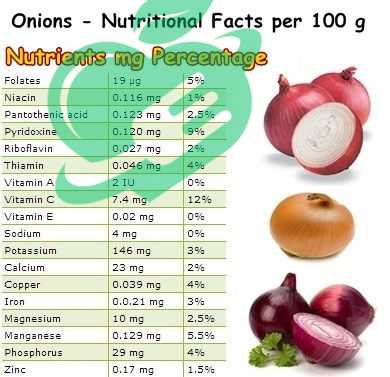
Potential Health Benefits of Red Onion
As one delves deeper into the remarkable qualities of red onions, it becomes clear that their nutritional bounty translates into a host of potential health benefits. From fighting inflammation to supporting heart health, these sulfonyl compounds offer much more than just flavor enhancement. Let’s explore three key health benefits of onions that might inspire you to include them more frequently in your meals.
Anti-inflammatory Properties
One of the standout features of red onions is their impressive anti-inflammatory properties. The presence of quercetin, a powerful antioxidant, has been shown to help combat inflammation.
- Red onions can reduce swelling and pain associated with chronic conditions, such as arthritis.
- Regular consumption may also help alleviate allergies, as quercetin acts as a natural antihistamine.
For instance, a friend of mine with seasonal allergies found significant relief after incorporating more red onions and other quercetin-rich foods into her diet!
Heart Health Benefits
When it comes to heart health, red onions truly shine. Several studies suggest that the antioxidants and compounds in onions can contribute to overall cardiovascular well-being.
- They can help lower blood pressure and cholesterol levels.
- The anti-inflammatory properties support the lining of blood vessels, promoting better circulation.
A few slices of red onion on a sandwich or in a salad could be a simple yet effective way to bolster your heart health.
Digestive Health Benefits
Last but not least, red onions play a vital role in digestive health. They are a good source of fiber, which is essential for maintaining gut health.
- Fiber aids digestion and helps prevent issues like constipation.
- The prebiotic properties of onions can support the growth of beneficial gut bacteria, leading to a healthier microbiome.
For those who struggle with digestive problems, adding cooked or raw red onions to meals may be a delicious way to enhance gut health. In summary, the anti-inflammatory nature, heart health benefits, and digestive support offered by onions make them a worthy addition to any diet. Just imagine—by simply including these colorful bulbs in your meals, you might be doing your body a favor!
Read also to Make Perfect Green Onion Pancakes
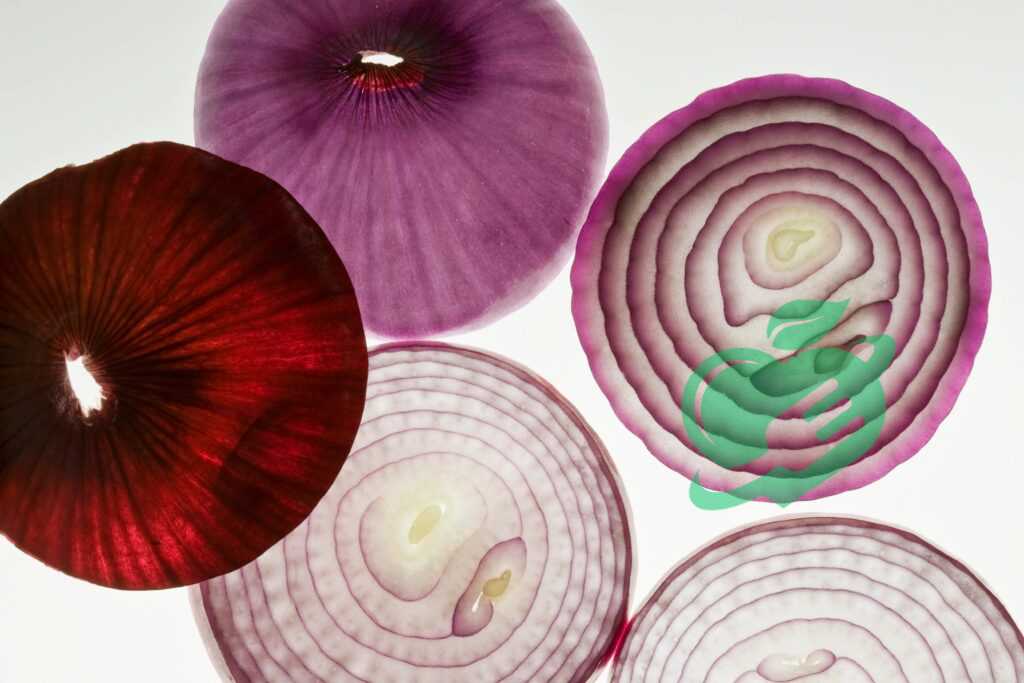
Red Onion and Cancer Prevention
Building on the myriad health benefits of red onions, research has increasingly highlighted their potential role in cancer prevention. With a growing body of evidence, these vibrant vegetables appear to offer protective effects against certain types of cancers. Let’s dive into the studies and mechanisms that point to onions as promoters of health and wellness.
Studies on the Anticancer Effects
Numerous studies have been conducted to investigate the anticancer properties of onions, revealing some promising insights:
- Colorectal Cancer: A study found that individuals who consumed higher amounts of onions, particularly onions, had a lower risk of developing colorectal cancer. Researchers believe that the antioxidants and sulfur compounds in these onions contribute to this protective effect.
- Breast Cancer: Another piece of research identified a correlation between a diet rich in red onions and a reduction in the proliferation of breast cancer cells. The study’s authors noted that the quercetin in onions might inhibit tumor growth.
- Prostate Cancer: Preliminary findings suggest that red onion extracts can reduce the risk of prostate cancer by promoting apoptosis, or programmed cell death, in cancer cells.
These studies reveal a solid foundation for how red onions may play an influential role in cancer prevention.
Mechanisms of Cancer Prevention
The mechanisms by which red onions may help prevent cancer are equally fascinating. Key components of onions contribute to these effects:
- Rich in Antioxidants: Compounds such as quercetin and anthocyanins combat oxidative stress in cells, thus reducing DNA damage and the risk of mutations that can lead to cancer.
- Anti-inflammatory Effects: The anti-inflammatory nature of quercetin works to lower inflammation within the body. Chronic inflammation is a known risk factor for many types of cancer, so reducing it can play a crucial role in prevention.
- Blocking Tumor Formation: Some studies suggest that the sulfur compounds in red onions may inhibit the growth of tumors and prevent their spread.
For instance, a close relative shared how including onions in her meals not only enhanced flavor but also made her feel proactive about her health. She often tosses them into salads, and stir-fries, and even enjoys them raw as a topping on her favorite dishes. In summary, the research surrounding red onions provides compelling evidence of their potential in cancer prevention. Incorporating these potent bulbs into daily diets offers a flavorful strategy for promoting overall well-being and reducing cancer risk.
Read also: How to Make Hearty Barley Beef Soup at Home
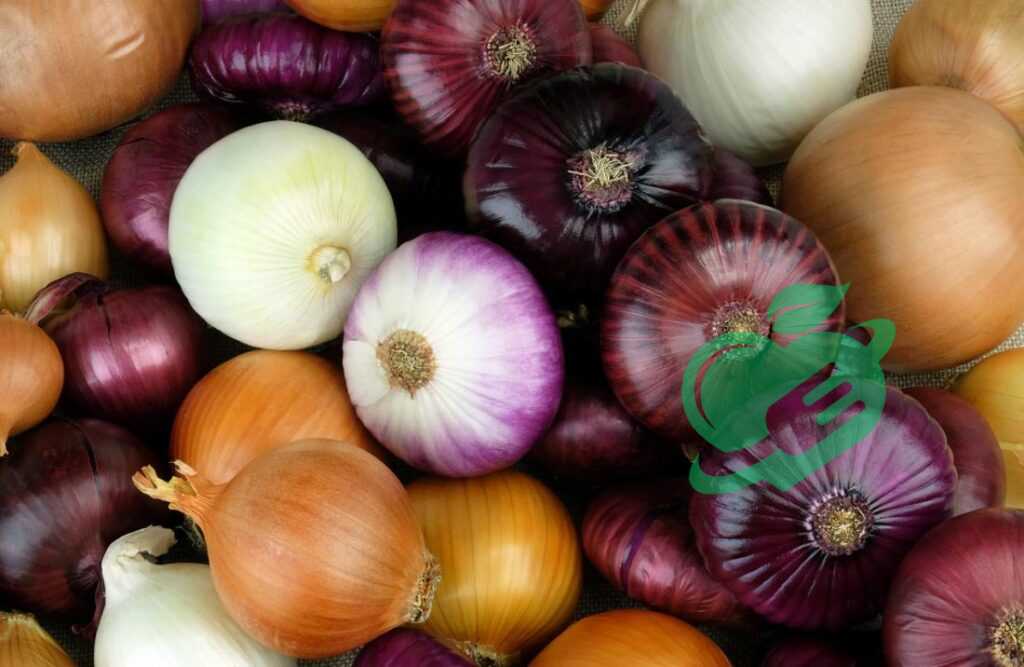
Red Onion for Immune Support
Having explored the cancer-preventive qualities of red onions, it’s essential to address their remarkable role in immune support. During the colder months or times of stress, having a robust immune system is essential. Onions, with their array of nutrients and potent compounds, can be a valuable ally in bolstering the body’s defenses. Let’s delve into how onions impact the immune system and discover some practical ways to incorporate them into your routine.
Impact on the Immune System
Red onions offer a diverse range of benefits that directly influence the immune response. Here are some of their main contributions:
- Rich Source of Antioxidants: The quercetin found in red onions combats oxidative stress and enhances immune function. This antioxidant helps to reduce inflammation, which in turn supports the body’s ability to ward off infections.
- Antimicrobial Properties: Red onions possess natural antimicrobial and antiviral properties, making them effective in fighting off common colds and infections.
- Vitamin C Content: This vitamin is crucial for immune health, and red onions provide a decent amount. Regular intake of vitamin C can help reduce the duration and severity of illnesses.
For instance, during a recent winter season, a friend regularly added sliced red onions to her soups and stir-fries, claiming it helped keep her colds at bay. While data is anecdotal, many swear by the benefits of onions during cold and flu season.
Ways to Incorporate Red Onion for Immune Support
Integrating red onions into daily meals is easier than one might think. Here are some creative and delicious strategies:
- Salads: Add thinly sliced red onions to salads for a crunchy texture and robust flavor.
- Soups and Stews: Incorporate them into your favorite soups and stews. Their sweet flavor complements a variety of dishes while providing immune-boosting properties.
- Salsas and Dips: Mix chopped red onions into fresh salsas or dips like guacamole for an antioxidant kick.
- Pickling: Pickled red onions can be a tasty addition to sandwiches and tacos, enhancing both flavor and health benefits.
Making onions a part of your meals can be both enjoyable and beneficial. By leveraging their immune-supporting properties, one can help fortify their body against common illnesses. Embracing these versatile bulbs can not only elevate your dishes but also empower your immune health!
Read also: Experience the Best of Seafood with Red Lobster Menu
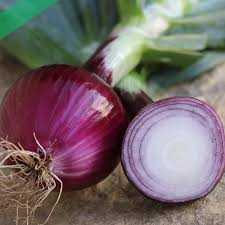
Red Onion in Managing Blood Sugar Levels
Previously, we explored how red onions provide immune support, but their health benefits don’t stop there. Another significant aspect of these colorful bulbs is their potential role in managing blood sugar levels. For those dealing with glucose regulation issues or even diabetes, incorporating onions into the diet might offer some essential advantages. Let’s take a closer look at how onions affect blood glucose and their overall role in diabetes management.
Effects on Blood Glucose
Research suggests that red onions can have a positive influence on blood glucose levels. The sulfur compounds and flavonoids present in onions contribute to their blood sugar-regulating properties. Here’s how they work:
- Improved Insulin Sensitivity: Quercetin, a vital antioxidant in red onions, has been shown to help improve insulin sensitivity. This can lead to better blood sugar control, which is crucial for individuals with insulin resistance.
- Reduced Blood Sugar Spikes: The fiber content in red onions helps slow the digestion of carbohydrates, leading to more gradual increases in blood sugar levels after meals. This can help prevent the dramatic spikes that often accompany high-carb foods.
A friend of mine who has type 2 diabetes noticed a significant improvement in her blood sugar readings after she began adding raw red onions to her meals. She found that they not only enhanced flavor but also played a role in managing her glucose levels.
Role in Diabetes Management
Incorporating onions into a diabetes-friendly diet can be a beneficial strategy. Here are fantastic ways to include them:
- In Salads: Toss raw red onions into salads for a fresh crunch that adds flavor without excessive calories or carbs.
- As a Topping: Use sautéed or grilled red onions as a topping for lean protein sources, such as chicken or fish, for added health benefits.
- In Stir-Fries: Cook them along with other colorful vegetables for a nutritious and balanced meal. Combine them with low-glycemic index foods like quinoa and legumes.
- In Soups: Add red onions to soups for depth and flavor, without impacting blood sugar significantly.
In summary, the effects of red onions on blood glucose levels showcase their utility in diabetes management. By incorporating these flavorful bulbs into daily meals, individuals may not only savor their taste but also enjoy enhanced metabolic health. Making small adjustments can lead to substantial impacts on blood sugar regulation!
Read also: What Is a Red Herring? Find Out Now!

How to Include Red Onion in Your Diet
Having discussed the myriad health benefits of red onions, it’s now time to explore some practical ways to include these vibrant bulbs in your daily meals. With their versatility and robust flavor, onions can easily enhance a variety of dishes. Let’s look at some cooking tips and delicious recipes, followed by creative serving suggestions that will help you make the most of red onions.
Cooking Tips and Recipes
Red onions can be utilized in an array of cooking methods, allowing their flavor to shine in different culinary styles. Here are some tips and simple recipe ideas:
- Raw: Thinly slice raw red onions for salads or sandwiches. Their crunch adds excellent texture and flavor.
- Recipe Idea: Classic Greek Salad—combine diced cucumbers, tomatoes, Kalamata olives, and feta cheese with sliced red onions and a drizzle of olive oil.
- Sautéed: Lightly sauté red onions in olive oil to soften their sharpness. This creates a sweet and savory base for many dishes.
- Recipe Idea: Sautéed Red Onion and Zucchini—combine sliced onions with zucchini and bell peppers, seasoned with herbs like basil or oregano.
- Grilled: Red onions can also be grilled for a smoky flavor that’s perfect for burgers or grilled meats.
- Recipe Idea: Grilled Veggie Skewers—alternate red onion chunks with bell peppers, cherry tomatoes, and mushrooms on a skewer, brushing with a marinade before grilling.
- Pickled: Quick-pickling red onions adds zing to meals and is an excellent way to preserve their crunch.
- Recipe Idea: Quick-Pickled Red Onions—soak thinly sliced onions in vinegar, water, sugar, and salt for at least 30 minutes before using.
Serving Suggestions
Now that you’ve cooked with red onions, here are some tips on how to serve them to maximize their flavor and health benefits:
As a garnish: Use them chopped or minced to garnish dishes like tacos, nachos, or chili. This not only provides a refreshing flavor but also boosts the nutritional value.
In Dips: Mix finely chopped red onions into guacamole or hummus for an extra layer of flavor. Their pungency balances the creaminess of these dips.
In Sandwiches and Wraps: Add thinly sliced onions to sandwiches and wraps for a satisfying crunch and a great summer flavor.
As a Side Dish: Serve onions grilled alongside meats or as part of a vegetable platter. They pair well with just about everything.
Incorporating onions into your diet can be both fun and flavorful. With these cooking tips and serving suggestions, enjoying their health benefits has never been easier. So get creative in the kitchen and start adding these colorful bulbs to your meals!
Read also: Unlocking the Secrets of Pickle: Tangy and Crunchy Delight
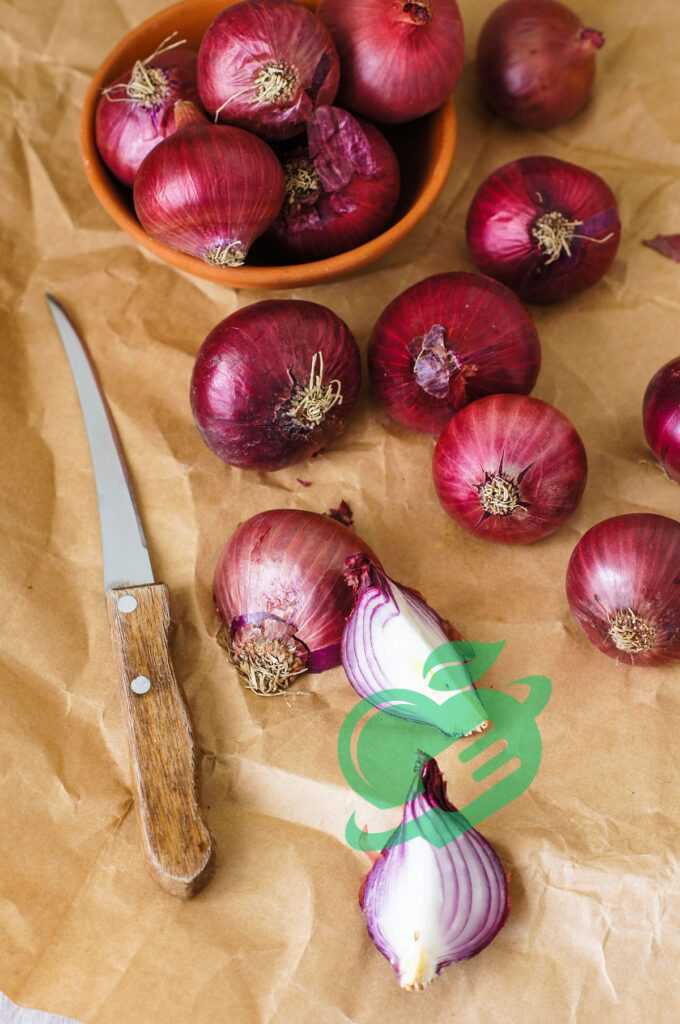
Risks and Precautions When Consuming Red Onion
While red onions are a powerhouse of nutrients and offer numerous health benefits, it’s essential to approach any food with awareness, as there can be risks associated with their consumption. Understanding these risks allows individuals to enjoy onions safely. Let’s explore two primary concerns: allergic reactions and potential digestive issues.
Allergic Reactions
Allergic reactions to red onions, while relatively uncommon, can occur in some sensitive individuals. Symptoms may range from mild to severe, including:
- Skin Reactions: Hives, itching, or skin rashes can develop around the mouth or other areas.
- Gastrointestinal Distress: Some might experience nausea, vomiting, or stomach cramps after consuming red onions.
- Respiratory Issues: In rare cases, allergic reactions can lead to difficulty breathing or swelling of the throat.
It’s always wise for individuals with known allergies to consult with their healthcare provider before incorporating new foods into their diet. For example, a distant relative of mine developed an itchy rash after eating raw red onions at a picnic, leading her to later discover she had a mild allergy. If someone experiences symptoms after consumption, it’s crucial to seek medical attention promptly.
Digestive Issues
On the other hand, it can also be a source of digestive discomfort for some individuals, primarily due to its high fiber and specific carbohydrate content:
Gas and bloating: The fiber and fructans in onions can lead to gas and bloating, especially for those with sensitive digestive systems or conditions such as irritable bowel syndrome (IBS).
Heartburn or acid reflux: Some people may experience an increase in heartburn symptoms after eating raw onions due to their sharp, pungent flavor.
To mitigate these effects, individuals may choose to cook red onions rather than eat them raw, as cooking can break down some of the fibers and fructans that contribute to digestive issues. In conclusion, while the benefits of onions are numerous, consumers need to be aware of potential risks and adjust their intake based on individual tolerance. By recognizing signs of allergies or digestive discomfort, individuals can enjoy onions safely and reap their health advantages without adverse effects.
Read also: The Ultimate Guide to Cooking with Green Onion.
Frequently asked questions
Which onion is better, red or yellow?
Red onions are best enjoyed raw, while yellow onions are ideal for cooking. Typically, red onions have a slightly sweeter flavor, unless you’re using a sweet onion variety.1
Is red onion healthier than white?
White and yellow onions have nearly the same nutritional value, while red onions are distinguished by the presence of anthocyanins, which provide their vibrant color. These anthocyanins are a form of antioxidant known to potentially lower the risk of chronic illnesses such as heart disease and cancer. 2
What does purple onion do for the body?
Heart health: Purple onions are rich in compounds that may support cardiovascular health. They have been linked to lower blood pressure, decreased cholesterol levels, and enhanced overall heart function. Including purple onions in a balanced diet could lead to a healthier heart. 3
Which color onion is healthiest?
All kinds of onions are beneficial for your health, but this dark reddish-purple type, often referred to as purple onion, contains particularly high amounts of quercetin and other beneficial plant compounds known as flavonoids. Flavonoids are responsible for the colors found in numerous fruits, vegetables, and flowers. 4
Does onion burn belly fat?
Indeed, researchers from Hokkaido Information University in Japan have found that it has a rich concentration of a flavonoid known as quercetin. This compound not only possesses antioxidant and antihypertensive properties, but it may also aid in reducing excessive visceral fat—the detrimental fat that surrounds your abdominal organs. 5
Do red onions increase testosterone?
Red onions are high in vitamin C and vitamin B6, both of which contribute to testosterone production. Vitamin C is associated with elevated testosterone levels, while earlier research suggests that vitamin B6 plays a role in testosterone synthesis. (( menshealthclinic ))
How often should you eat red onions?
It is advisable to consume 100 grams of onions daily. Onions are packed with nutrients, offering not only protein, dietary fiber, folic acid, a range of vitamins, calcium, selenium, potassium, and phosphorus, but also two unique compounds: quercetin and prostaglandin A. 6
Is red onion good for weight loss?
One of the numerous advantages of eating onions is their ability to aid in fat reduction. Rich in quercetin and low in calories, red onions also provide a great source of soluble fiber. Because of their minimal calorie count, onion soup frequently assists individuals in losing weight rapidly.7
Is onion good for skin?
A 2016 research review indicated that onion extracts can eliminate various types of bacteria. This characteristic can benefit your skin, as bacteria may exacerbate inflammation on its surface. Additionally, the antibacterial properties are useful when managing active acne breakouts. 8
What happens to your body if you eat onions everyday?
Vriti Srivastav, a holistic dietitian, noted that the sulfur compounds in onions contribute to heart health, help regulate blood pressure, and aid in preventing blood clots. She also mentioned that the sulfur compounds, along with quercetin and chromium present in onions, enhance insulin sensitivity and help prevent or manage insulin resistance. 9
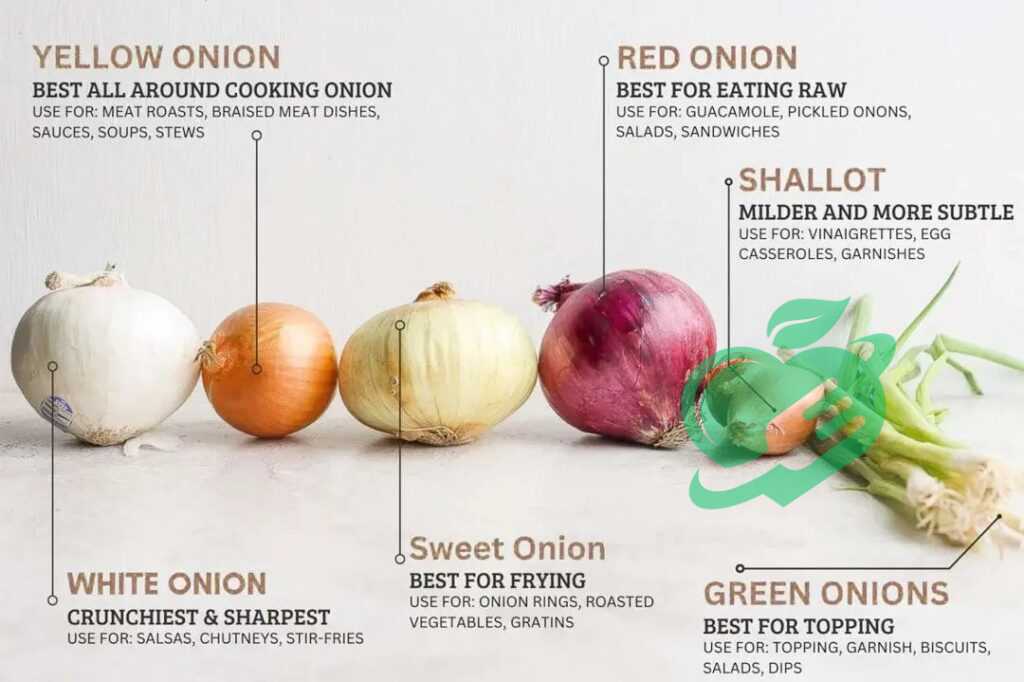
Summary of the Health Benefits
As we wrap up our exploration of red onions, it’s essential to take a step back and appreciate the many health benefits these vibrant bulbs offer. From enhancing meals to supporting overall health, onions can significantly affect your diet. Let’s summarize the key advantages and why you might want to include these onions in your meals more often.
Rich Nutritional Profile
Red onions boast a broad spectrum of nutrients, including:
- Vitamins: They are a good source of Vitamin C and several B vitamins, which support immune function and overall health.
- Minerals: Potassium and manganese present in onions contribute to heart health and maintain bodily functions.
- Antioxidants: Compounds like quercetin and anthocyanins help combat oxidative stress, offering protective effects against chronic diseases.
Health Benefits Galore
Incorporating red onions into your diet can yield a host of health benefits:
- Anti-inflammatory Properties: The quercetin content helps minimize inflammation, benefiting conditions such as arthritis and allergies.
- Heart Health: Regular consumption has been associated with lower blood pressure and improved cholesterol levels.
- Digestive Support: Their fiber content promotes gut health, aiding in digestion while preventing constipation.
Cancer Prevention and Immunity Boost
Research highlights red onions as valuable in cancer prevention, showcasing their ability to reduce tumor growth and improve insulin sensitivity, which is crucial for managing blood sugar. Furthermore, their antimicrobial properties and vitamin C content can significantly enhance immune support, helping ward off illnesses. In conclusion, onions are more than just a flavorful addition to meals; they are packed with numerous health benefits that support immune function, heart health, digestion, and potentially even cancer prevention. So, whether you toss them into salads, sauté them in your favorite stir-fry, or enjoy them pickled, consider empowering your health with these dynamic bulbs. Integrating red into your diet can be a simple yet impactful step toward a healthier lifestyle!
Your body is a mirror of what you eat, so make your food your source of strength and health. Choose with love and awareness what nourishes your body and soul, and be a friend of nature and its colors on your plate, because proper nutrition is the key to a life full of energy and wellness. Follow us constantly, as we strive to provide more useful articles and reliable information that make a difference in your daily life and help you achieve your health goals.



